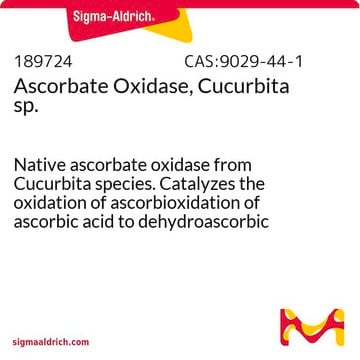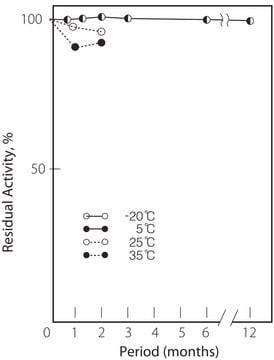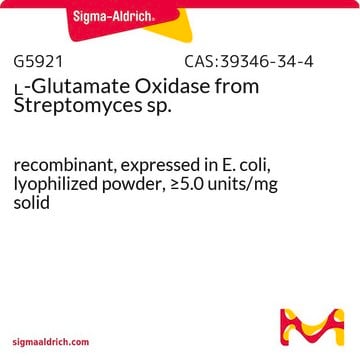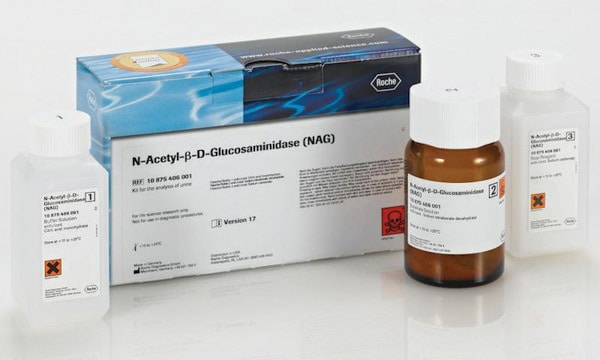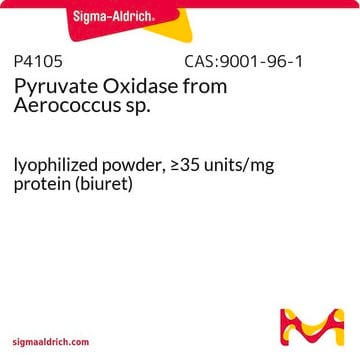A0157
Ascorbate Oxidase from Cucurbita sp.
lyophilized powder, 1,000-3,000 units/mg protein
Synonym(s):
L-Ascorbate:oxygen oxidoreductase, Ascorbase
Sign Into View Organizational & Contract Pricing
All Photos(2)
About This Item
Recommended Products
biological source
plant (Cucurbita spp.)
Quality Level
form
lyophilized powder
specific activity
1,000-3,000 units/mg protein
storage temp.
2-8°C
Looking for similar products? Visit Product Comparison Guide
General description
Ascorbate oxidase is a homodimeric enzyme, which comprises 552 amino acid residues per subunit (zucchini). It corresponds to a molecular mass of 70kDa per subunit. This enzyme is mainly found in plants, fungi and eubacteria.
Application
Ascorbate Oxidase from Cucurbita sp. has been used:
- as a supplement in the culture medium for differentiation into osteoblasts
- to oxidize ascorbic acid producing monodehydroascorbate in monodehydroascorbate reductase assay
- in determining ascorbate (AsA) and dehydroascorbate (DHA) concentrations
Ascorbate oxidase, from Cucurbita sp., may be used to study oxidative stress and heat stress response and tolerance. Ascorbate oxidase, from Sigma, has been used in ascorbic acid assays to study the heat stress response of Arabidopsis .
Biochem/physiol Actions
Ascorbate oxidase (AO) participates in cell growth by regulating reduction/oxidation (redox) of the apoplast. This enzyme can synthesize the oxidative molecule dehydroascorbate acid (DHA) in the apoplast. It is also involved in cell elongation and enlargement development.
Ascorbate oxidase converts ascorbic acid to dehydroascorbic acid. It is highly specific for L-ascorbic acid and a few analogs. Ascorbate oxidase exists as a dimer and has a molecular weight of approximately 140 kDa.
Unit Definition
One unit will oxidize 1.0 μmole of L-ascorbate to dehydroascorbate per min at pH 5.6 at 25 °C.
Physical form
Lyophilized powder containing buffers and sucrose as stabilizer.
Signal Word
Danger
Hazard Statements
Precautionary Statements
Hazard Classifications
Resp. Sens. 1
Storage Class Code
11 - Combustible Solids
WGK
WGK 1
Flash Point(F)
Not applicable
Flash Point(C)
Not applicable
Personal Protective Equipment
dust mask type N95 (US), Eyeshields, Gloves
Certificates of Analysis (COA)
Search for Certificates of Analysis (COA) by entering the products Lot/Batch Number. Lot and Batch Numbers can be found on a product’s label following the words ‘Lot’ or ‘Batch’.
Already Own This Product?
Find documentation for the products that you have recently purchased in the Document Library.
Customers Also Viewed
Copper metalloenzymes
Messerschmidt A
Comprehensive Natural Products II: Chemistry and Biology (2010)
Ming Liu et al.
Analytical sciences : the international journal of the Japan Society for Analytical Chemistry, 27(5), 477-477 (2011-05-12)
An amperometric L-ascorbic acid (AA) biosensor fabricated by immobilizing ascorbate oxidase (AO) in poly(3,4-ethylenedioxythiophene) (PEDOT) and multi-walled carbon nanotubes (MWCNTs) composite films was reported for the first time. The entrapment of AO in PEDOT/MWCNTs composite films was performed during an
Manuel A Matamoros et al.
Journal of experimental botany, 61(1), 87-97 (2009-10-14)
In plant cells, antioxidants keep reactive oxygen species at low concentrations, avoiding oxidative damage while allowing them to play crucial functions in signal transduction. However, little is known about the role of antioxidants during fruit maturation, especially in legumes. Snap
Cotton ascorbate oxidase promotes cell growth in cultured tobacco bright yellow-2 cells through generation of apoplast oxidation
Li R, et al.
International Journal of Molecular Sciences, 18(7), 1346-1346 (2017)
Nidhi Chauhan et al.
The Analyst, 136(9), 1938-1945 (2011-03-19)
An ascorbate oxidase (AsOx) (E.C.1.10.3.3) purified from Lagenaria siceraria fruit was immobilized covalently onto a carboxylated multiwalled carbon nanotubes and polyaniline (c-MWCNT/PANI) layer electrochemically deposited on the surface of an Au electrode. The diffusion coefficient of ascorbic acid was determined
Our team of scientists has experience in all areas of research including Life Science, Material Science, Chemical Synthesis, Chromatography, Analytical and many others.
Contact Technical Service